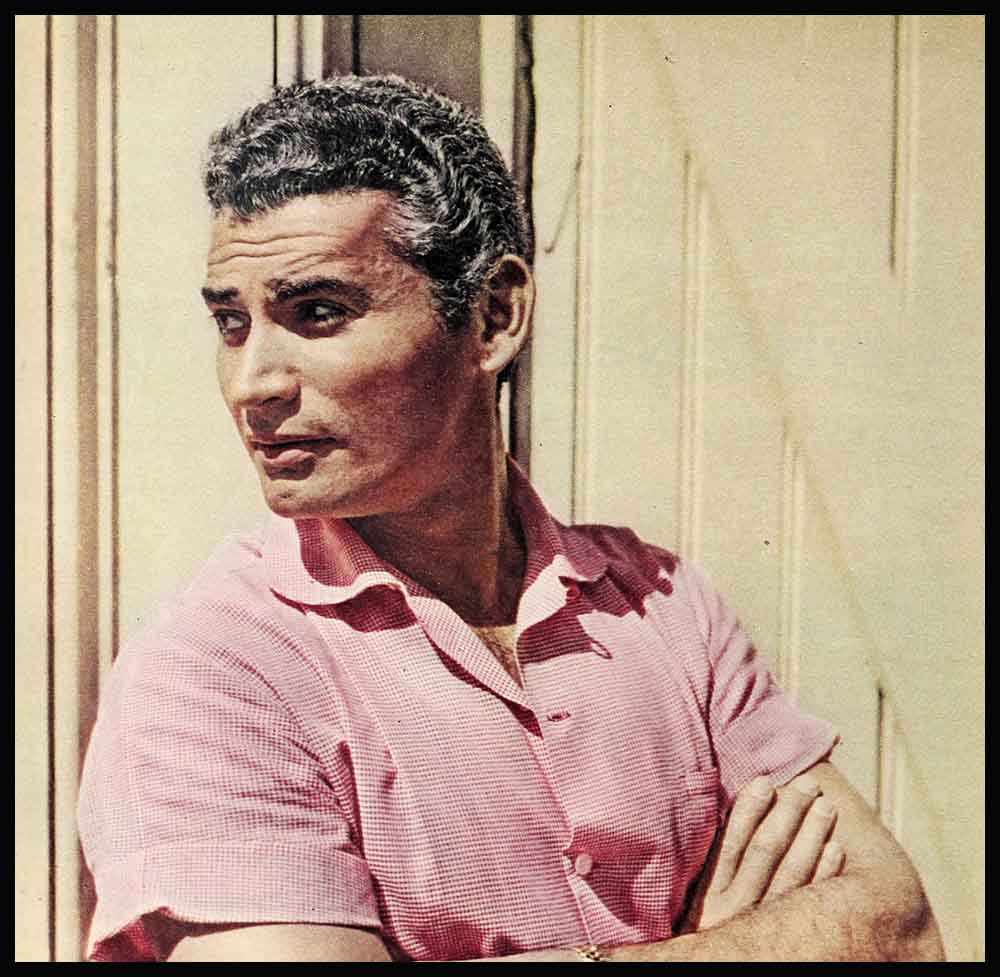
Jeff Chandler’s Other Love
Only a handful of Hollywood insiders are aware that deep in the secret hearts of Susan Hayward and Jeff Chandler a childhood love, like a tree, grew and flourished long ago in Brooklyn. In that inhospitable clime—compounded of noisome vapors from the nearby gas tanks and turgid waters of the Gowanus Canal—that tremulous romance of early adolescence withered. But its roots were entwined tightly in their youthful hearts and, intimates believe, it never died.
Two years ago, a filmland executive who grew up with Jeff and Susan in Flatbush said, “You know, it’s too bad that Susan Hayward ever married Jess Barker. I’ve always felt the only real love in her life was Jeff Chandler. But Susan had no time for romance when she met him; she had a one-track mind and its ultimate destination was the Broadway stage. Her drive for success was unrelenting. The same went for Jeff. They were both unhappy kids, not so much because they were short of money, but because they were short of a satisfying prospect for the future. Life was grim and earnest, and love had to take a back seat. So their paths separated, and by the time they were both ready to consider marriage, he w as a GI in the Aleutians and she was a rising young star in Hollywood.
“Maybe I’m an old sentimentalist, but I think it’s tragic that they drifted apart. Because Susan and Jess Barker—no matter what they say—aren’t happy. And neither are Jeff and his wife, Marjorie. It’s interesting to speculate on what would have happened if they’d kept that boy-meets-girl flame from flickering out. But it’s too late now.”
It was then. But now it isn’t. For when Jess Barker and Susan quarrelled so violently that Sunday night, their marriage—as of that moment—was over. And, curiously enough, at almost the same time, Jeff and Marjorie Chandler announced that their two-year-old attempt at reconciliation hadn’t worked.
So it was natural for that handful of informed insiders, even though none of them was a mathematician, to put two and two together and arrive at four. Nothing now stood in the way of a revival of that long dormant romance.
One thing must, however, be made crystal-clear. Their teen-age Brooklyn romance had absolutely nothing to do with the breaking up of these two marriages. For while Jeff Chandler, when he was separated from Marge for the first time in 1951, became somewhat of a minor Casanova for seven months—squiring such important stars about as Ann Sheridan, Linda Darnell, Joan Crawford, Piper Laurie and many others—no one ever saw him with Susan. Never has that glamorous Brooklyn redhead allowed a wisp of scandal to shadow her marriage.
In the star-spangled city, a curious custom obtains. The moment film personalities cut themselves from the confining yoke of marriage via a statement to the press, they rush into the joys of single life.
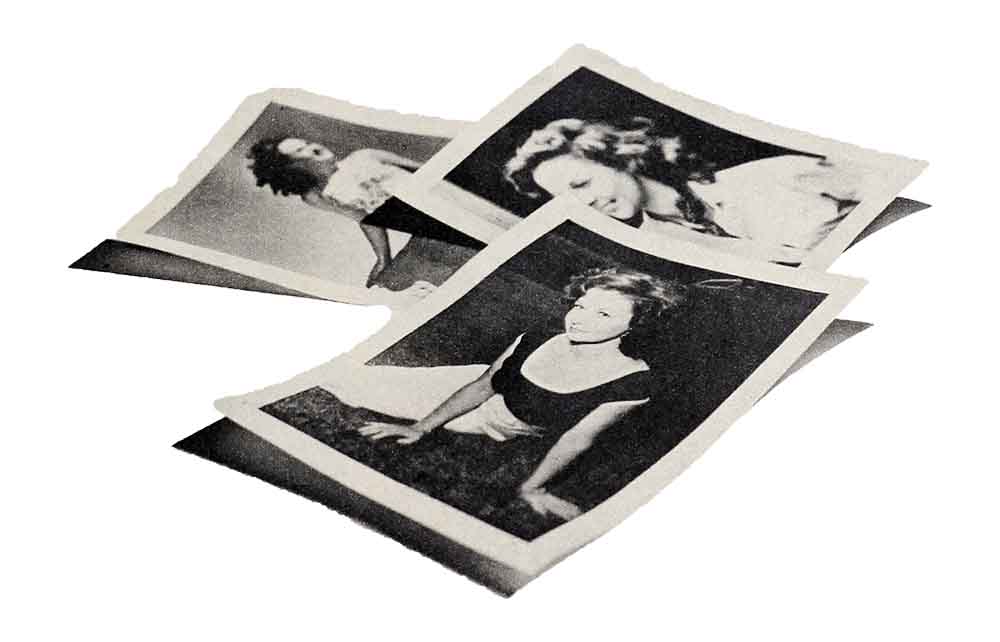
So it was merely routine for columnists to scribble that six-foot-four Jeff was offering Susan his mammoth Brooklyn shoulder to cry on, that is when he wasn’t regaling Joan Crawford with his newly-discovered singing voice.
Quickly Susan Hayward had her answer for the press: “Jeff Chandler isn’t divorced. I can assure you I’m not going out with a married man, even if he is separated from his wife.”
For his part, Jeff Chandler reported: “I am not having dates with Susan Hayward. Nor with Joan Crawford. Columnists have nothing to write about on certain dull days so they dream up these stories.”
Now everyone knows that the beauteous Susan Hayward is a great dramatic actress, acknowledged to be one of the town’s finest, But the greatest acting she ever did over the years was in her press interviews when she’d vow, again and again, “Jess and I are happy. Our marriage is the best thing about us.”
Naturally, during this present unhappy period of waiting for Jess Barker to accept the property settlement she wants him to accept, Susan is understandably careful about anything which might influence him in the divorce negotiations.
But recently, quite by accident, an incident occurred which doesn’t altogether bear out Susan’s protestations. The columns reported that Susan, an avid Dodger fan, was off to see the World Series in New York, accompanied by her twin boys and her hairdresser and long-time friend, Emmy Eckhart. As it happened, I was seeing my sister off on the same plane at the Los Angeles International Airport. Jeff Chandler was at the airport too.
Of course, the long arm of coincidence might have been working overtime and he might have been seeing someone else off. But he was chatting with a woman I recognized as Emmy Eckhart. Obviously Jeff, who has a well-developed eye for the ladies, wasn’t out there to wave good-bye to middle-aged Mrs. Eckhart. In fact, come to think of it, it’s odd that he should even know her.
A second incident took place not long afterwards. A Hollywood column carried a report based on a conversation with Susan immediately after her return from New York and the World Series. Jeff Chandler called the columnist to check the source of the news. “Is Susan back from New York already?” he asked forthrightly. “I want to call her.”
And shortly after that, Susan and Jeff stopped making a secret of their dates, began to be seen together in public.
They have much in common—these two: a background of poverty geared to the tempo of the tenements; early adjustment to life’s seamier realities, which has resulted in emotional maturity for both; an overwhelming ambition to perfect their acting techniques; financial security after uncomfortable closeness to actual malnutrition during their early Hollywood days. They have both known the heartaches and the torments of broken marriage as well as the joys of parenthood.
Susan, then Edythe Marrener, part-Irish, part-French and part-Scotch, was born in Flatbush thirty-three years ago. Her father was a subway laborer who had earlier been a Coney Island barker; her grandmother was a famous Irish actress, Kate Harrigan; and her mother was an intensely emotional and dramatic woman who frequently climaxed arguments with her husband by extending her arm and saying “Go on, break it, break it . . .”
Jeff Chandler, born Ira Grossel thirty-four years ago in Brooklyn, was the son of Jewish immigrant parents, his father an Austrian silk salesman. his mother a Russian factory worker. When he was barely three, his parents, after constant bickering, divorced; and Jeff and his mother went to live with her parents while she tried to earn enough to support the son whom she loved above all else. Finally she opened a tiny candy store and Jeff helped her run it.
“That’s why,” he once explained, “I couldn’t join the Footlighters, a dramatic club, when I was attending Erasmus Hall High School.” But before that, while at P.S. 181, he had noticed an intensely feminine and moody little girl with a flaming mop of curly red hair. Already Susan gave promise of her future exquisite beauty but a certain belligerence in her manner, a standoffish quality kept her from being popular, though admiring glances were frequently turned her way. Jeff’s deep-socket brown eyes already bore the trace of melancholy which adds so much to the quality of animal magnetism he was later to exploit so successfully.
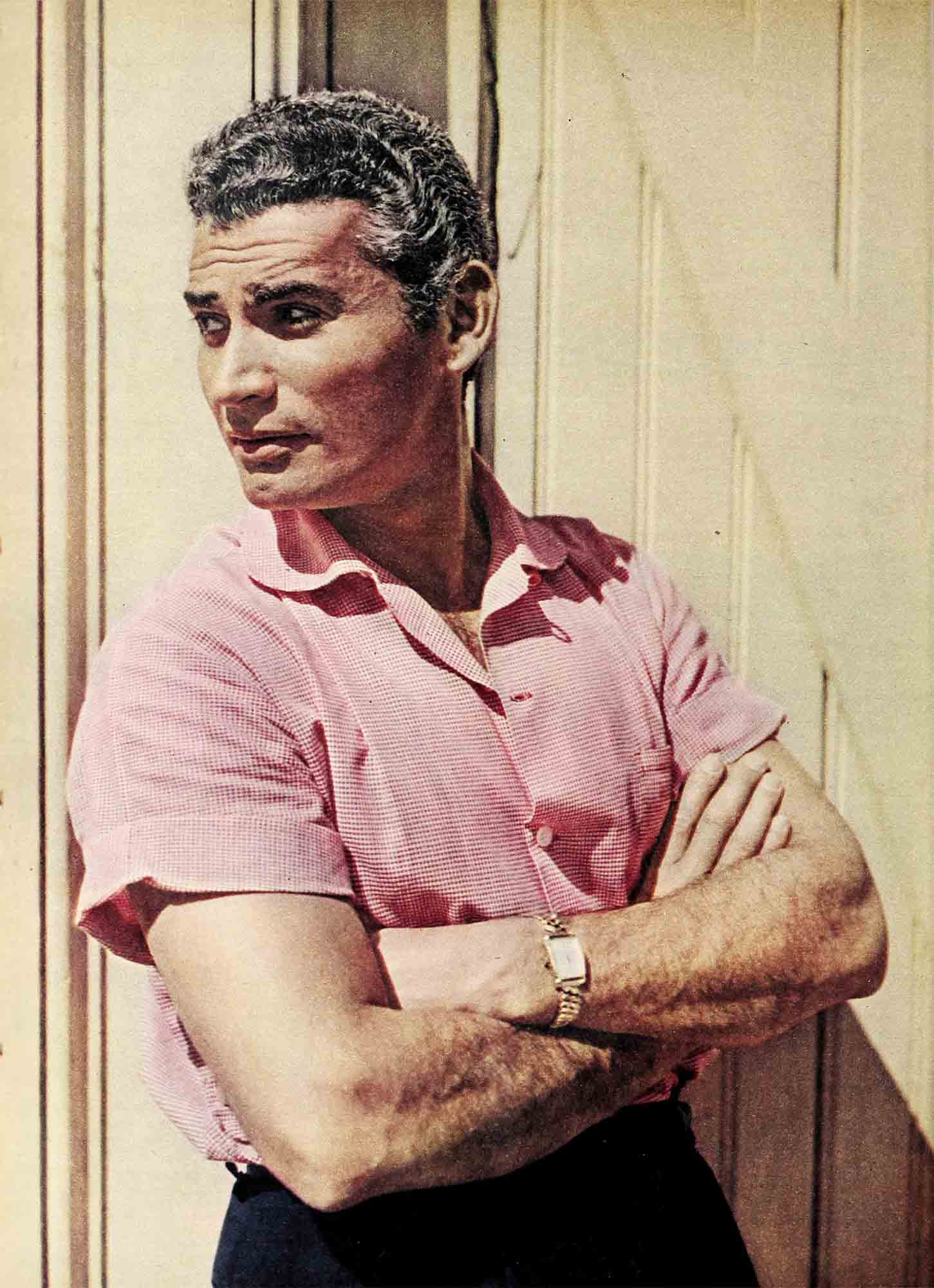
I wanted more than anything to be an actor,” Jeff recalls, “but I didn’t know how to go about it. “Then the teacher gave me a part in a minor scene from Shakespeare. I felt more than a little foolish about the whole thing because I had to brandish a pointer and pretend it was a sword. I was very shy and I died inside when the kids laughed But I noticed one girl staring big-eyed, not smiling. She was Susan—and right then and there I fell desperately in love with her. Another boy would have wangled a seat near her in the classroom. Not I.
“But I managed to get up enough nerve to talk to her after school that afternoon. ‘You didn’t laugh at me,’ I said. No, she whispered. ‘That’s because I’m going to be an actress on Broadway when I grow up, and I know how you felt.’ ‘I’m going to be an actor, too,” I told her. ‘But sometimes I think maybe I ought to be a commercial artist. Mama says it’s easier to make a living.’ ‘Art is the thing I love second best, too,’ Susan said. ‘But no matter what of how long it takes I’m going to be an actress. I want to make enough money so I can have a car and take my mother for rides on Sunday in the park. I want to earn $75 a week!’
Gosh, that’s a lot of money,’ I said.
Susan had her answer ready: ‘Daddy always says a person has got to fight for whatever he wants. You’ve got to be like a ball. The harder they hit you, the higher you’ll bounce.’ ”
Jeff carried some of that same philosophy home with him. Susan was already playing leads in school plays, strongly encouraged by her teachers, and Jeff was determined to be in them too in order to be near her. “I know now,” says Jeff. ‘that the reason I pushed for class presidency several times, and won several times, was to satisfy instinctive yearnings to ‘perform.’ ”
Jeff tried out hopefully for a school musical. Susan had already been cast in the production and Jeff hoped to get a role that would keep him near her. “I began to sing,” he says, “but that was the day my voice decided to change and I was alternately a tenor and a bass. Miss Rappaport, the teacher, who was my second love, had to give the part to another boy. Even today the memory still hurts. But all was not lost. I was made stage manager and during the performance Susan told me that she had a headache. I ran three blocks to the nearest drugstore and spent my full week’s twenty-five-cent allowance for a bottle of aspirins. Susan was grateful and I went home that night and wrote a very bad poem about the limpid green of her eyes.”
Susan and Jeff’s romance, Flatbush fashion, did not include genteel dancing school soirees or ice-skating parties. The pavement was their lovers’ lane; the brownstone stoops, their parlor for serious discussions of the future. Jeff, hurrying to work in his mother’s store, sometimes walked Susan to the “day-old” bakery where she picked up the family supply of bread, saving pennies. On the way, both kept a wary eye out for pop bottles which they turned in at the market for hard cash. That cash was hoarded for weekly visits to the neighborhood movies.
Jeff was proud of Susan when she secured a job—the only girl with a newspaper route for the Brooklyn Daily Eagle “When I was a kid,” Susan once said, “I always figured, ‘No, we can’t have that, That’s thirty cents and we can’t buy anything over a quarter.’ Except once a year. And that was for my birthday cake. I bought it at Ebinger’s bakery and I was allowed to choose it at the fantastically huge sum of sixty cents.”
Susan went on to Girls’ Commercial High (now called Prospect Heights High); Jeff, to Erasmus Hall High. Then for her, it was work as a photographer’s model—work she hated, while Jeff was studying drama on a free scholarship. And when Susan joined the army of hopefuls brought to Hollywood to try out for the role of Scarlett O’Hara, Jeff was working for ten dollars a week in a little theatre outside of Chicago. At twenty-two, he entered the army; at twenty-seven he emerged—ready to try Hollywood.
A year earlier (1944), Susan had married Jess Barker and in time, she became the mother of twin boys; two years later, Jeff married Marjorie Hoshelle, an actress whom he’d met in little-theatre work years before, and he ultimately became the father of two daughters. Behind both Susan and Jeff were the years of struggle to gain recognition in Hollywood. But it’s ironic that when they had succeeded beyond their most avid Brooklyn dreams career-wise, their personal lives collapsed.
“When Marge and I separated before, I found there was no shortage of lovely feminine companionship. This can, of course, be very inflating to the male ego. But it is no substitute for the solidarity of marriage,” admits Jeff, soberly.
Once again Jeff is finding no shortage of feminine companionship, for there is no place in the country with so many beautiful, successful, lonely women as Hollywood. But Susan will find that in filmland there is a frenetic battle for escorts. Just as certain types of lawyers chase ambulances, so do certain. Hollywood lovelies watch for the first sign of a marital breakup in order to snag the newly freed male. Some divorcees, like Ginger Rogers and Shelley Winters had to go abroad to find husbands, and then try t o launch them on careers. When Jacques Bergerac, Ginger’s very youthful husband, was dropped by M-G-M, the wags said, “Now he’ll have to be plain Mr. Ginger Rogers. But is that had?”
For Susan, such a second marriage would be more than bad. She’s been through it once, and it was a short cut to heartbreak. But she is aware that her adored sons need male companionship. “I plan to invite many married friends to the house so that my boys will have a chance to be with men,” she explains. Of course, Jess, who loves his sons dearly, comes for frequent visits.
The chances are that Susan Hayward and Jeff Chandler will continue to see each other. As to an eventual marriage—that is anybody’s guess.
One thing is certain. The gray-thatched Jeff, his head towering in the clouds, and the petite red-haired beauty will make one of Hollywood’s handsomest couples. More important, they appear to be highly compatible. Career jealousy is reputed to have broken up both their marriages, but this would be no danger with these two equally important stars.
Both are interested in art, in the theatre, in music, baseball; both understand the social limitations which a cinema career entails. Both love children. And both are given to bursts of temper—Susan more than Jeff. But humor glints in both their eyes and laces their speech.
Lately, a personality change has come over Jeff which worries some of his friends. Formerly rather introverted, silent and moody, he now gets up tn night clubs and at parties, giving forth with wisecracks, popular tunes or imitations.
Marge, they say, became irritated by this new Jeff; called him “Cochise Lewis.” How the anti-social, withdrawn Susan will react to this new extroversion is problematical. Certainly she doesn’t agree with his philosophy that “being in pictures automatically makes you unlike what you would be if you were in another profession. You can’t just walk down the Street and mind your own business. But frankly, I like people to stop me on the Street and recognize me.”
If this slight air of Golden Bantam doesn’t sit well with Susan, she must certainly admire Jeff’s approach to his profession—for it is exactly like her own. Both are perfectionists, seriously anxious to do the best work possible.
Susan and Jeff have come a long way since those days at P.S. 181. Can they recapture their childhood dream again? Those who knew them both when they were “young and pure in heart” devoutly hope they can.
THE END
(Susan is in ‘‘Demetrius and the Gladiators,” Jeff in “Yankee Pasha.”)
It is a quote. PHOTOPLAY MAGAZINE JANUARY 1954


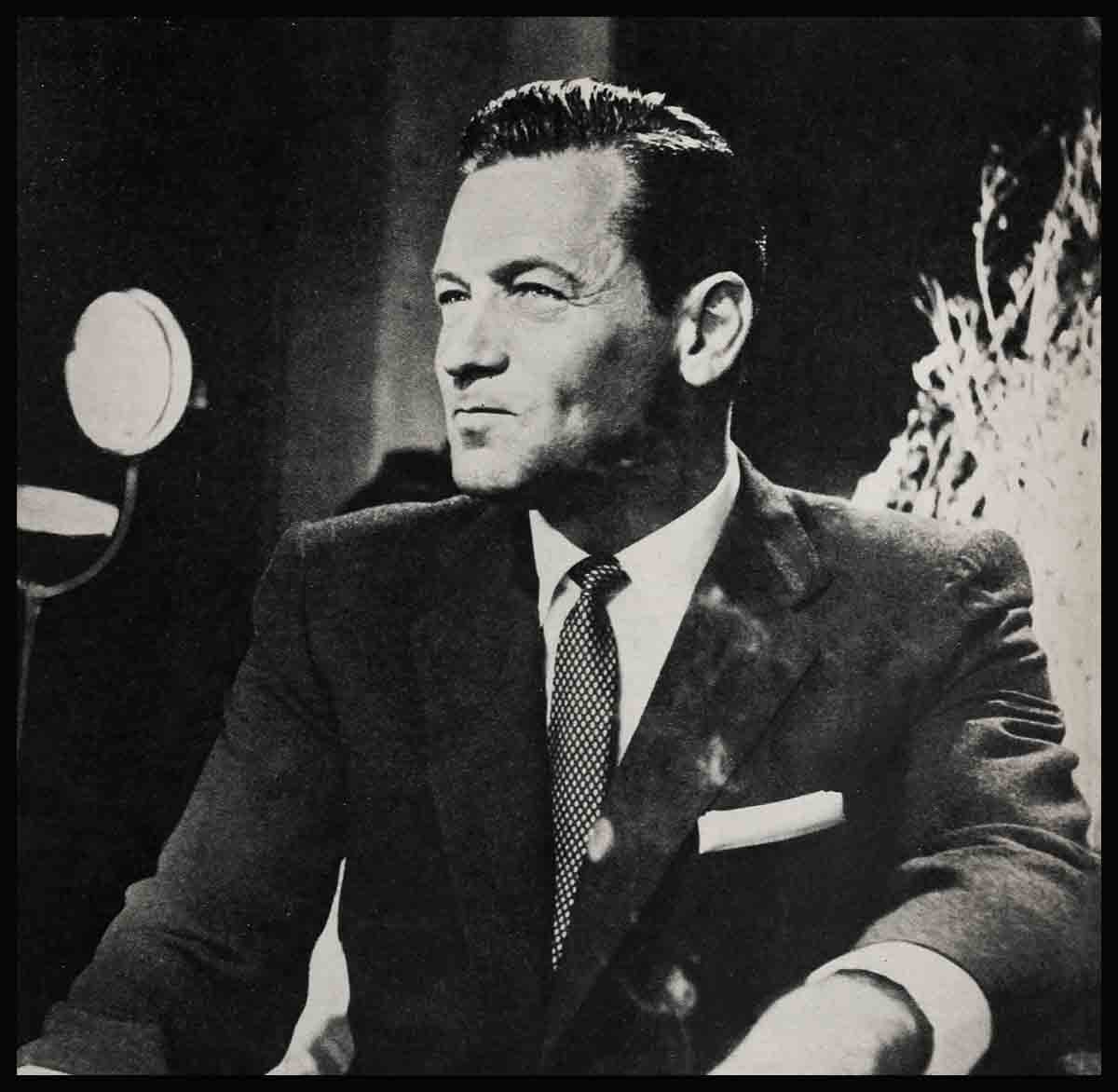

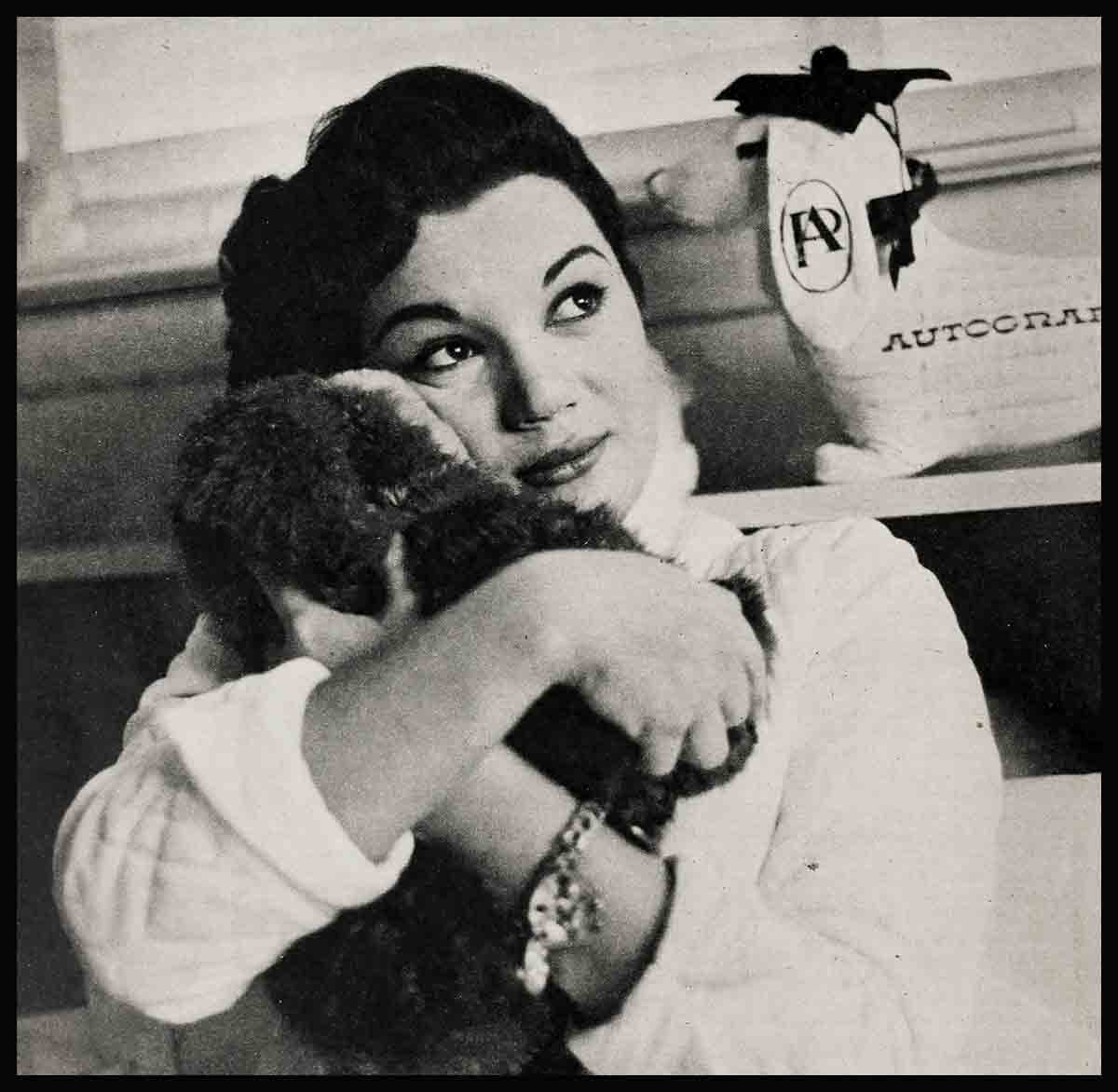
No Comments